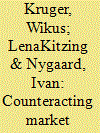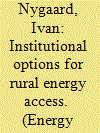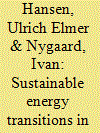| Srl | Item |
| 1 |
ID:
176123


|
|
|
|
|
| Summary/Abstract |
Competitive bidding programmes, or auctions, are becoming the dominant method for procuring utility-scale renewable energy generation capacity and have coincided with significant cost reductions of renewable energy (RE) technologies. The use of price in auctions as the main awarding criterion has been criticized for apparently leading to market concentration and dominance in project ownership. We investigate: to what extent South Africa's renewable energy auction programme has contributed to market concentration and dominance; if market concentration and dominance have a negative impact on electricity cost in the auction; and to what extent measures taken to counteract market concentration and dominance have led to improved competition and diversity of project ownership.
|
|
|
|
|
|
|
|
|
|
|
|
|
|
|
|
| 2 |
ID:
094404


|
|
|
|
|
| Publication |
2010.
|
| Summary/Abstract |
The concept of the multifunctional platform for rural energy access has increasingly been supported by donors in five West African countries since 1994. While it is often referred to as a highly successful concept, recent reviews and interviews with local stakeholders in Mali and Burkina Faso indicate that the high aspirations to be found in project descriptions and early evaluations are only partly reflected in activities on the ground. This paper illustrates how the multipurpose aspects of the platform have made the concept a nexus of potential achievements that are highly valued in the dominant discourse of development, and how including concerns, such as poverty alleviation, gender equity, local democracy, decentralisation and the environment, have attracted donors outside the energy sector. The paper thus argues that, while the integration of multiple technical functions, preconceived organisational set-ups and local fuel production have in fact had limited or even adverse effects on the outcome of the multifunctional platform programme, these virtues have proved essential in presenting the concept at the policy level. This analysis of the dilemma between mobilizing funding and implementing practical programmes provides an argument for building development aid on existing structures instead of inventing new complicated concepts and approaches.
|
|
|
|
|
|
|
|
|
|
|
|
|
|
|
|
| 3 |
ID:
128050


|
|
|
|
|
| Publication |
2014.
|
| Summary/Abstract |
The economic development in emerging economies in Southeast Asia has significantly increased the use of fossil fuel based energy. This has severe implications for global climate change, and against this background, scholars within the sustainable transition tradition have taken an interest in addressing how transitions towards more sustainable development pathways in this region may be achieved. This paper contributes to the abovementioned literature by examining the conducive and limiting factors for development and proliferation of a palm oil biomass waste-to-energy niche in Malaysia during the period 1990-2011. Rising oil prices, strong pressure on the palm oil industry from environmental groups, and a persisting palm oil biomass waste disposal problem in Malaysia appear to have been conducive to niche proliferation, and on top of this national renewable energy policies and large-scale donor programmes have specifically supported the utilisation of palm oil biomass waste for energy. However, in spite of this, the niche development process has only made slow progress. The paper identifies reluctant implementation of energy policy, rise in biomass resource prices, limited network formation and negative results at the niche level, as the main factors hindering niche development.
|
|
|
|
|
|
|
|
|
|
|
|
|
|
|
|